Character & Citizen Education
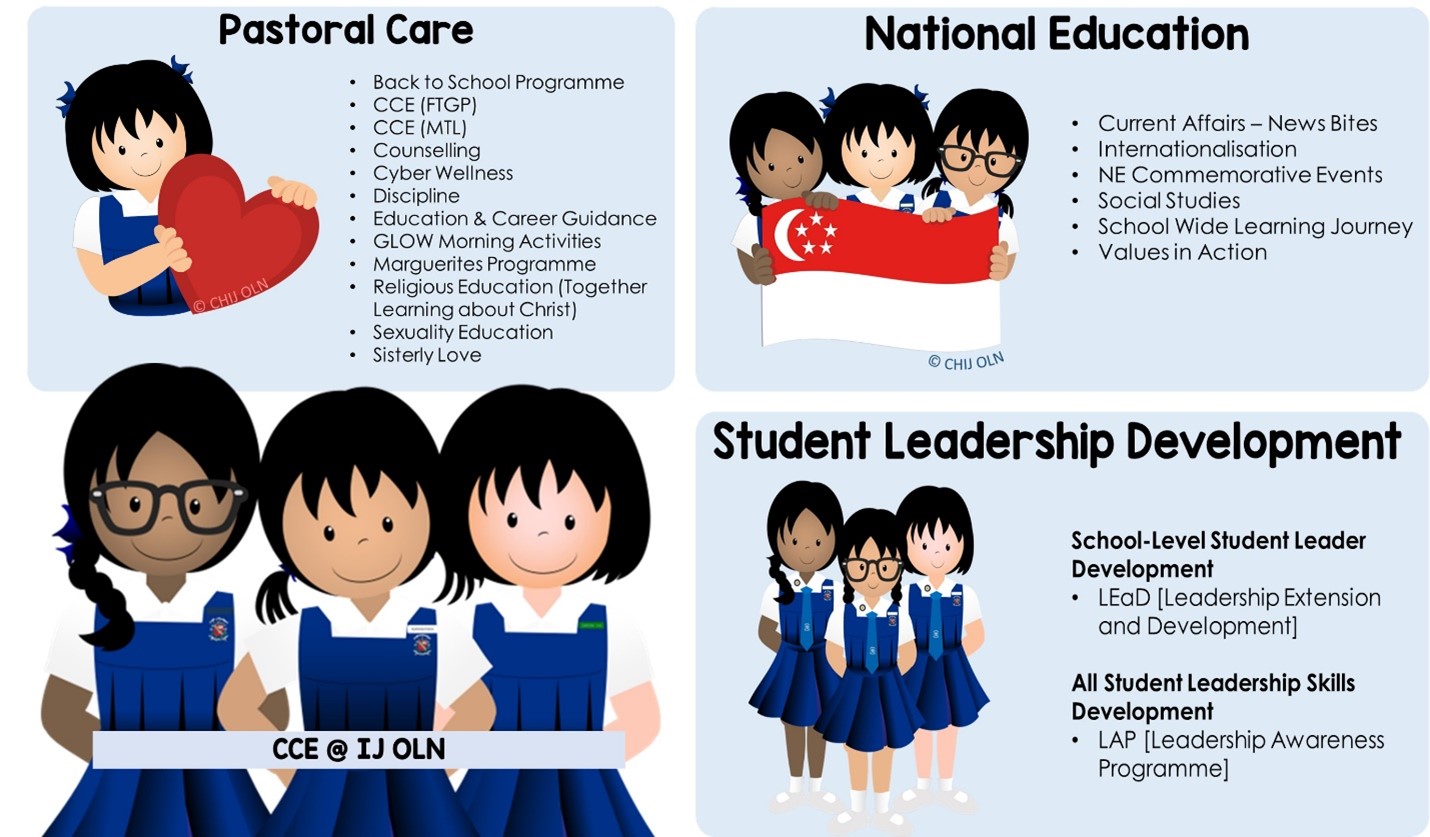
The Character & Citizen Education (CCE) Department oversees student learning in the three main areas - Pastoral Care, National Education and Student Leadership Development. At CHIJOLN, we believe in creating authentic learning experiences to help each student develop in character, social-emotional well-being, and citizenship dispositions.
Key Programmes
CCE Lessons – CCE Form Teacher Guidance Period (FTGP) and CCE Mother Tongue Languages (MTL)
At CHIJ OLN, we believe that students’ learning would be optimized in
a caring school environment. This is done through building positive teacher-student
relationship (TSR) and student-student relationship (SSR).
CCE (FTGP) allows teachers and students to interact and build relationships
while learning values, skills and knowledge through discussion of contexts
and case studies. In CCE (MTL), students deepen their values and citizenship
dispositions through discussion of social issues. They also learn to be
responsible to their family and community and understand their roles in
shaping the future of our nation.
Peer support lessons such as help-seeking and help-giving skills are also
taught in CCE (FTGP). This seeks to cultivate peer support mindset and
skills in every student.
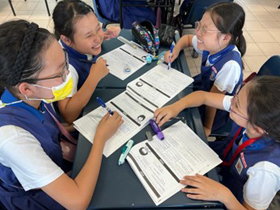
|
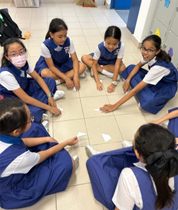
|
|
Group discussion during a CCE lesson |
Circle Time |
Values-in-Action
Values-in-Action (VIA) are learning experiences that support students' development as socially responsible citizens. At CHIJ OLN, the VIA programme encourages students to make a positive difference and emphasises compassion and commitment to serve others, particularly the marginalised or disadvantaged.
Each level embarks on a project that will make a positive difference in the lives of their family members, classmates, school and community levels. Through the VIA programmes, students have opportunities to demonstrate and apply their knowledge, skills and values and contribute meaningfully to the community.
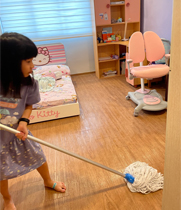
|
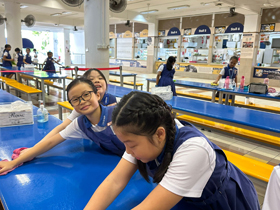
|
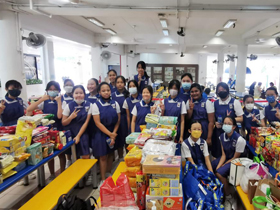
|
|---|---|---|
|
Helping out with |
Cleaning common spaces |
Organising a food donation |
National Education & Social Studies Curriculum
National Education aims to develop national cohesion, cultivate the instinct for survival as a nation and instill in our students confidence in our nation’s future. It also cultivates the necessary citizenship dispositions: to have a sense of belonging, hope, reality and a will to act.
National Education is pervasively implemented in CHIJOLN through Social Studies lessons, NE Commemorative Days, VIA activities and School Wide Learning Journeys. Here are some examples of our NE Commemorative Days activities in school:
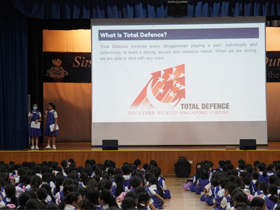
|
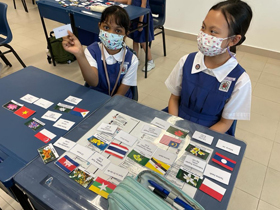
|
|---|---|
|
Total Defence Day |
International Friendship Day |
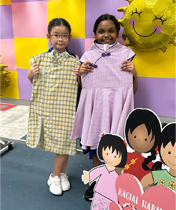
|
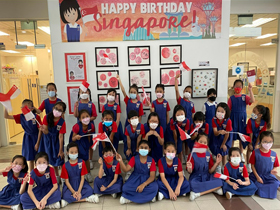
|
|
Racial Harmony Day Carnival |
CHIJ OLN celebrates National Day |
School Wide Learning Journeys
To extend learning beyond the classroom and to provide all students with
opportunities to explore their Singaporean identity, all students will
participate in at least two learning journeys a year. Through pre-, during-
and post-visit experiences to museums, parks, trails etc, our students
make connections between what concepts, values and dispositions they are
taught and what they experience. Here are some examples of our School Wide
Learning Journeys:
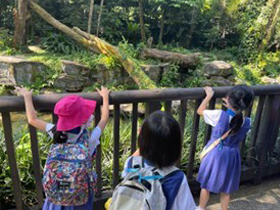
|
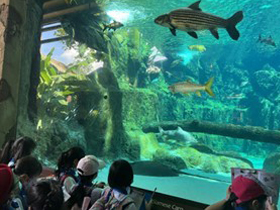
|
|---|---|
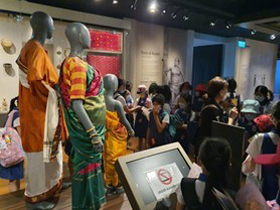
|
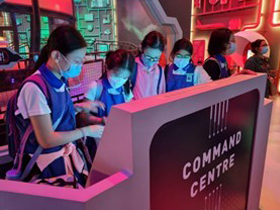
|
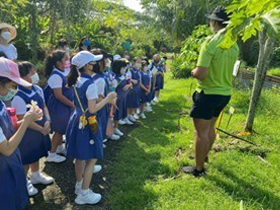
|
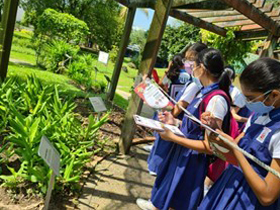
|
Cyber Wellness
Technology impacts students’ development in their learning and thinking. We aim to help our students become responsible digital learners who will be able to protect themselves, as they navigate the cyberspace.
The main platform for the delivery of cyber wellness lessons is through
CCE (FTGP) and Cyber Wellness week. Care Ambassadors are also trained to
promote the message of cyber wellness to their peers by giving presentations
and supporting the cyber wellness programmes in the school. It is also
augmented by work done by other programmes e.g. ICT Dept’s #ThinkER.
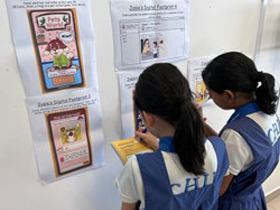
|
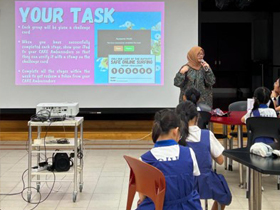
|
|
Cyber Wellness lesson during CCE (FTGP) |
Care Ambassadors training on cyber wellness |
Education & Career Guidance
Education and Career Guidance (ECG) starts even when the students are in primary school. ECG is incorporated in the CCE (FTGP) lessons and aims to equip students with the necessary knowledge, skills and values to make informed education and career decisions. Through ECG, students are provided with opportunities to learn more about their interests, abilities, and passions. They also get to explore various education and career pathways across different industries.
Students enjoy exploring MySkillsFuture, a one-stop portal with information and tools. Through this, they can investigate various education and career pathways.
Sexuality Education (for P5 and P6 students)
1. Sexuality Education (SEd) in schools is about enabling students to understand the physiological, social and emotional changes they experience as they mature, develop healthy and rewarding relationships with others, including those with members of the opposite sex, and make wise, informed and responsible decisions on sexuality matters. SEd is premised on the importance of the family as the basic unit of society. This means encouraging healthy, heterosexual marriages and stable nuclear family units with extended family support. The teaching and learning of SEd is based on respect for the values and beliefs of the different ethnic and religious communities in Singapore on sexuality issues.
2. The Goals of Sexuality Education are:
(a) Support students in managing their physiological, social and emotional changes as they grow up and develop safe and healthy relationships.
(b) Guide students to make wise, informed and responsible decisions on sexuality matters.
(c) Help students develop a moral compass and respect for themselves and others by having positive mainstream values and attitudes about sexuality that are premised on the family as the basic unit of society.
3. The Key Messages of Sexuality Education are:
(a) Love and respect yourself as you love and respect others;
(b) Build positive relationships based on love and respect (which are the foundation for strong families);
(c) Make responsible decisions for yourself, your family and society; and
(d) Abstinence before marriage is the best protection against STIs/HIV and unintended pregnancies. Casual sex can harm and hurt you and your loved ones.
You may click here for more information on MOE Sexuality Education.
OVERVIEW OF CHIJ OUR LADY OF THE NATIVITY’S SEXUALITY EDUCATION PROGRAMME FOR 2026
4. Sexuality Education is delivered in a holistic manner through the school curriculum. The content for Sexuality Education is grouped into five main themes: Human Development, Interpersonal Relationships, Sexual Health, Sexual Behaviour, and, Culture, Society and Law. You may click here for more information on the scope of Sexuality Education in the school curriculum.
5. The subjects that incorporate topics on sexuality include:
-
Science
-
Character and Citizenship Education (CCE)
Sexuality Education Lessons
6. The upper primary years mark the onset of puberty. With better nutrition and improved health care, children are reaching puberty at a younger age and have to grapple with physical, emotional and psychological changes in themselves. The implication is that our children are becoming biologically ready for sexual activity sooner without necessarily having the corresponding cognitive or emotional maturity to modulate their behaviours. Furthermore, our young are also exposed to a wide range of influences that could endanger health and undermine the integrity of the family. Our students require close guidance so that they can respond with discernment to the sexual messages in the media and other sources.
7. Sexuality Education (SEd) lessons are taught as part of CCE (FTGP) at Primary 5 and 6. Through these lessons, students will learn healthy ways to manage the physiological, social and emotional changes in their growing years. They learn to build healthy and rewarding relationships with others, including those with members of the opposite sex. Students are also guided to make wise, informed and responsible decisions to keep themselves safe from sexuality-related risks.
At CHIJ Our Lady of the Nativity the following Sexuality Education lessons will be taught in 2026:


INFORMATION FOR PARENTS
8. Parents may opt their children out of Sexuality Education lessons, and/or supplementary sexuality education programmes by MOE-approved external providers.
9. Parents who wish to opt their children out of the Sexuality Education lessons need to complete an opt-out form. This form has been sent out to parents in October 2024.
10. Parents can contact the school at Email: chijoln@moe.edu.sg or Tel: 6385 2455 for discussion or to seek clarification about the school’s sexuality education programme.

